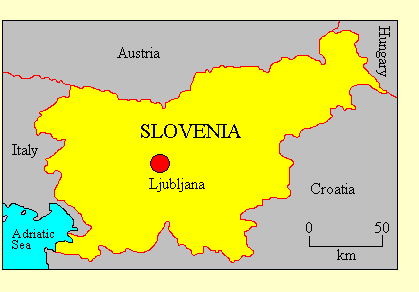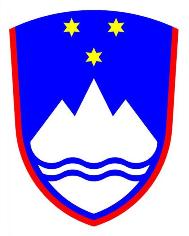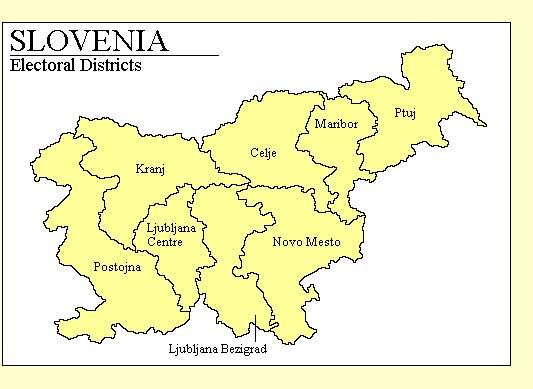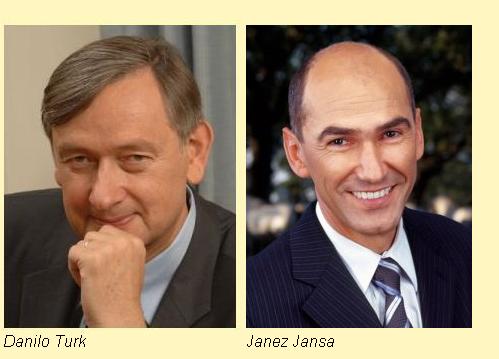

REPUBLIC OF SLOVENIA
• Official name: Republika Slovenija (Republic of Slovenia)
• Location: Western Europe
• International organisations: Council of Europe, European Union, North Atlantic Treaty Organisation,
Organisation for Security and Co-operation in Europe, United Nations, World Trade Organisation
• Borders: Austria, Croatia, Hungary, Italy
• Coastline: Adriatic Sea
• Land area: 20,273 Km2
• Population: 2,000,000
• Annual GDP (PPP) per capita: US$27,900 (2009 CIA estimate). World ranking: 37
• Ethnicity: Slovene 88%, Croat 3%, Serb 2%
• Languages: Slovene is the official language and is spoken by the great majority of the population. Small
minorities speak Serbo-Croatian, Italian, Hungarian and German.
• Religion: About 70% of the population are at least nominal Catholic Christians. There are small minorities
of Protestant and Orthodox Christians.
• Form of government: Parliamentary democratic republic. Slovenia is divided into 182 municipalities. For
electoral purposes it is divided into eight districts.

• Capital: Ljubljana
• Constitution: The
Constitution of the Republic of Slovenia came into effect on 23 December 1991.
• Head of state: The President, elected by direct universal suffrage for a five-year term. The President's
functions are largely ceremonial. President
Danilo Turk took office in December 2007.
• Head of government: The Prime Minister, appointed by the President. The Prime Minister is the leader of the
largest party in the legislature and is accountable to it.
• Legislature: Slovenia has a bicameral legislature, the Assembly of Slovenia (Skupscina Slovenije). The
State Chamber (Drzavni Zbor) has 90 members, elected for four-year terms. Of these 88 are elected by proportional representation and two are elected by ethnic minorities.
The State Council (Drzavni Svet) has 40 members, 18 representing local councillors and 22 representing various interest groups.
• Electoral authority: The Republic Elections Commission administers national elections
• Freedom House 2011 rating: Political Rights 1, Civil Liberties 1

• Transparency International Corruption Index: 59% (35 of 178 countries rated)
• Reporters Without Borders Press Freedom 2010 Index: 86.6% (46 of 178 countries rated)
• Heritage Foundation Economic Freedom 2010 Index: 62.7% (69 of 178 countries rated)
Political history
The Slovene speaking lands, usually known as Carniola or Carinthia, were brought under the rule of the
Austrian Hapsburgs in the 14th century, and were treated as an integral part of Austria until the late 19th
century. Despite intense Germanisation, however, the Slovenes retained their language and their Slavic
identity. When the Hapsburg Empire collapsed in 1918, the Slovenians joined with the other South Slav peoples
to form the Kingdom of Serbs, Croats and Slovenes, which became the Kingdom of Yugoslavia in 1929.
When the Germans overran Yugoslavia in the Second World War, northern Slovenia was annexed to Germany, and the southern half to the Nazi puppet
state of Croatia. In 1945 it became a republic of the new Communist Yugoslavia. Always Yugoslavia's most
prosperous and advanced republic, Slovenia declared its independence in 1991 and avoided the ruinous wars of
the other ex-Yugoslav republics. Slovenia joined the European Union in 2004.
Slovenia's largest parties are the centrist Democratic Party of
Slovenia, and the moderate Social Democratic Party of
Slovenia. The Social Democrats won the 2008 legislative elections, but at the 2011 election saw them suffer
a heavy defeat, and the Democratic Party leader Janez Jansa formed a government.
Updated March 2012
|


